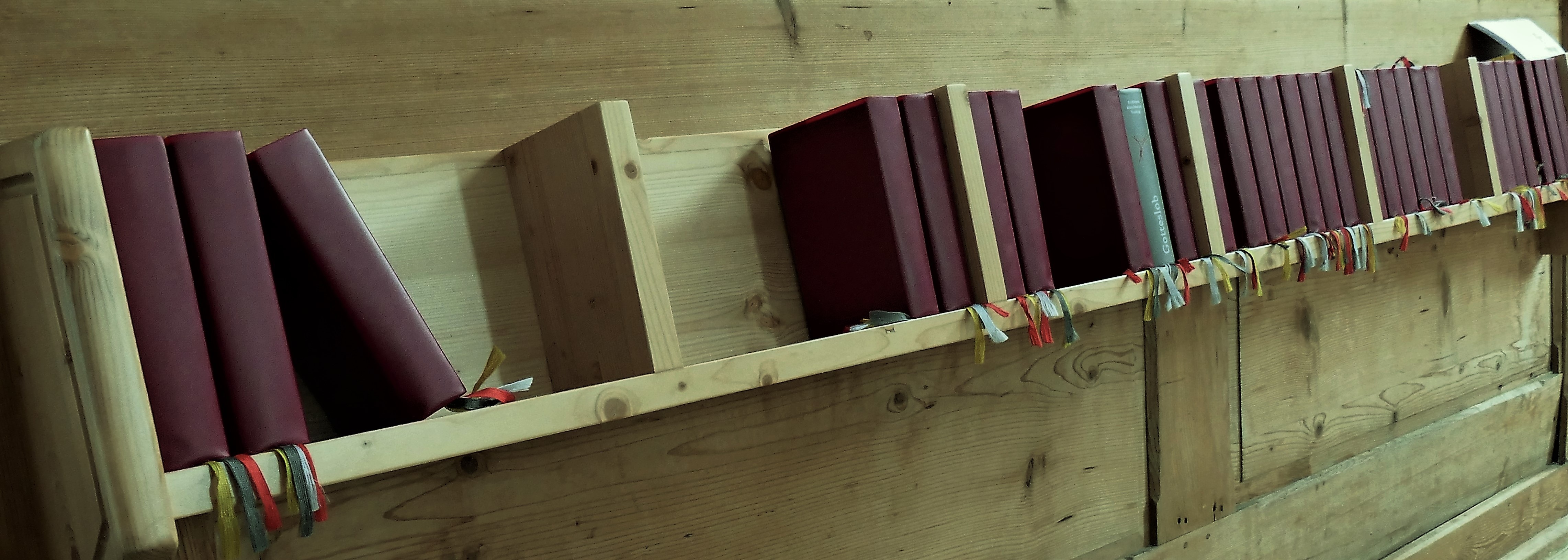We have talked about how important it is to thank and praise God our Father and the Lord Jesus for the work on the cross of Calvary. Recently I ran into it again in the Old Testament.
In Exodus, God gives His people the instructions for building the tabernacle and the priestly and sacrificial services that went with it. In itself it is quite striking how much attention God gives to this, especially if you also include the book of Leviticus. That alone means that it is extremely important to Him how His people 'draw near to Him'. As Christians we should then ask ourselves all the more and more earnestly how we should 'draw close' to God. How can we have 'communion with God' without falling into the mystical?
The Daily Sacrifice
In Exodus 29 we read from verse 38 about the daily sacrifices that the Israelites had to bring.
“Two one year old lambs every day, continuously. You are to prepare one lamb in the morning and the other lamb you are to prepare at nightfall. (…) as a pleasant fragrance. It is an offering made by fire to the Lord. It shall be a continual burnt offering throughout your generations, at the entrance of the tent of meeting, before the Lord. There I will meet you to speak with you. (…) I will then in the midst of the Israelites dwell, and I will be their God. And they shall know that I am the Lord their God, who brought them out of the land of Egypt, that I might dwell in the midst of them. I am the Lord their God.”
So every day, every morning and every evening a lamb for a burnt offering. There was to ascend from the altar to God always, day and night. To this the Lord God connects His presence in the midst of the people. That the Lord might dwell with His people was ultimately the purpose for which He brought them out of Egypt.
To us this can point to nothing but the Lamb of God Himself, our Lord Jesus Christ, the eternal Son of God Who became man to die on the cross in our stead. He is the One of Whom John said it'Behold the Lamb of God Who takes away the sin of the world' (John 1:29).

The base
In Numbers 28 we encounter the daily sacrifice again.
“You must take care of My offering – My food for My fire offerings, a sweet fragrance to Me – by presenting it to Me at the appointed tide. You shall say to them, This is the offering made by fire which you are to present to the Lord: two lambs a year old each day, without any blemish, as a continual burnt offering.” (Numbers 28: 1,2)
In chapters 28 and 29, Moses has to teach the people of God one more time about the sacrifices they must bring to Him. It starts with the daily burnt offering, the two lambs, which we also encountered in Exodus 29. These are mentioned first and on top of that are the offerings for the special occasions. On each sabbath a sabbath offering of two lambs, at the beginning of a new month a burnt offering of two young bulls plus a ram and seven lambs, offerings for the various festivals, and so on.
You could say that the offerings for the special days are 'carried' by the daily offerings. Without the daily constant sacrifices no special sacrifices.
Is it not the same with us? If we do not daily offer Him our sacrifices of praise and thanksgiving for the work on Golgotha's cross, what good is it to honor God together with others once a week on Sunday or a few times a year on special occasions? That is then no more than an outward form service, because our hearts are not involved during the week.
Is it just form or is it real?
We are all familiar with the frequently asked question of whether our faith is just a matter of religion or a real living relationship. Whether it's just a form or really a matter of our heart. This aspect emerges, for example, in Psalm 50[1], most of which is a reproach of God to His people who offer Him sacrifices, but in the meantime do not want to listen to His commandments and act (50:16-22). That is why their sacrifices mean nothing to God; He does not need them (50:7-13). After all, all animals are already His and their service is only a formal service.
But between the lines of this Psalm are a few notable passages worth highlighting. In the first and most direct sense, they refer to the believing remnant of Israel who will soon be delivered from the great tribulation by God Himself.
But we may also make an application for ourselves because they encourage us to have a living relationship with our Lord and Savior.
A relationship of sacrifices
The lyrics in question are as follows.
- Gather Me My favorites, who make a covenant with Me through sacrifices (50:5)
- Offer thanks to God and keep your vows to the Most High. call on Me in the day of trouble; I will help you out and you will honor Me (50:14-15)
- He who offers thanks will honor Me; to whomever walks in the right way, I will show God's salvation (50:23)
A Covenant of Sacrifices
Verse 5 is special and important:
“(…) My favorites, who make a covenant with Me through sacrifices”.
The relationship between God and 'His favorites' is based on the Sacrifice, which God Himself has provided. As Abraham said:God will provide Himself with the lamb for the burnt offering(Genesis 22:8). The Sacrificial Lamb, our Lord Jesus Christ, is the ground for our relationship with God. God gave His Son so that sinners might be forgiven and saved (see for example John 3:16; 1 John 4:9,10).
But in our text it is presented the other way around. The initiative does not come from God, but from the 'favourites'. They make the covenant with the Lord and enter into a relationship with Him. Anyone who has accepted the Lord Jesus as the atoning sacrifice for himself may on that basis go to God and honor and thank Him for it.
You start a relationship at a certain point, but after that you also have to maintain that relationship. You maintain your relationship with the Lord through sacrifices of praise and thanksgiving, “(…) spiritual sacrifices pleasing to God through Jesus Christ” (1 Peter 2:5).
Today you can hear Christians talking about their relationship with God or often even an "intimate relationship." But if you listen carefully you hear little or nothing about Christ the Crucified. Then something isn't right, isn't it? God's Word mentions it in this Psalm 'a covenant of sacrifices' and Paul writes in several places that we should only care about our Lord Jesus Christ.
“I will not at all boast of anything but the cross of our Lord Jesus Christ . . . ” (Galatians 6:14).
Our relationship with God the Father and the Lord Jesus Christ can only be maintained when we offer our daily sacrifices of praise and thanksgiving!
Sacrifice thanks to God
That it is God's desire that we offer peace offerings to Him is also apparent from verse 14, where we read the call “Sacrifice thanks to God (…)”. When God commanded the people to offer sacrifices to Him, it was not because of those animals. He was not hungry (see 50:12), so He needed those animals. But the sacrifice also had the purpose of involving their hearts. To put it this way:
God is not waiting for their sacrificial animals, but for the thanks of their hearts!
He wanted them to realize who the great and holy God is, yet so merciful and loving that He wants to dwell with sinful people. “Therefore you shall love the Lord your God with all your heart, with all your soul, and with all your strength..." (Deuteronomy 6:5).
The relationship with God is based on making sacrifices of thanksgiving to God, but it also involves taking care of them—His "favorites"—and saving them when they call on Him.
“call on Me in the day of trouble; I will help you out and you will honor Me” (Psalm 50:15).
Seeing the Salvation of God
When trouble comes upon the people of Israel, He searches for 'favorites'those are those who offer Him thanks and honor Him. Those who know that the Lord Jesus is the real Messiah and then call on Him to save them (50:15). They know Him, they believe in Him, know Who He is and what He did on the cross of Calvary. Therefore they honor and thank Him.
And because they do, He will come to deliver them from the distress. Because that's what it says in the last verse[2]:
“He who offers praise honors Me, and prepares the way that I may show him God's salvation." (RSV, Psalm 50:23).
Perseveringly thanking and honoring Him is seen as paving a way for the Lord to meet them with His salvation!
For us too it is God's 'commission' to thank Him, 'God's will' as Paul says:
“Thank God in everything. For this is the will of God in Christ Jesus for you.” (1 Thessalonicenzen 5:18)
When we give thanks for the cross of Calvary, we are defined by 'the salvation of God' and in particular the Person who is that Salvation, our Lord and Savior Jesus Christ. When He comes, our salvation is complete.
Salvation for the soul
When we offer sacrifices of thanksgiving to the Lord Jesus and God our Father, it is the desire of God's heart. It is "God's food" (e.g., Numbers 28:2). When we engage with the Lord Jesus and His Cross is that not also for our own hearts and souls the very highest and best thing we can do? When we engage in "God's salvation" would that not also be salutary for our own hearts? I think there is nothing more salutary for the human soul than constantly offering our sacrifices of thanks to Him.
Sacrifices of praise and thanks: the greatest we can give to God. Wouldn't that also be the most beneficial medicine for our own souls?
How many people – including Christians – are walking around with what we now call psychological complaints? I am becoming more and more convinced that the only remedy is to learn to offer sacrifices of praise and thanksgiving to God the Father and the Lord Jesus. It is something we must do and continue to do, despite the burden of our souls. Then, as it were, we pave a way through which God's salvation can reach and restore our souls. Then you can say it afterwards with the psalmist:
“. . . for the Lord has been good to me. Yea, O Lord, thou hast delivered my soul from death, my eyes from tears, my foot from stumbling. . . . I will offer thee an offering of thanksgiving, and call upon the name of the Lord.” (Psalm 116:7-8;17)
Abundance for our souls is the result, as we also read in Psalm 63:4-6
“My lips will praise You.
So will I praise You in my life, in Your name I will lift up my hands.
My soul will be filled as with fat and abundance;
my mouth will boast with lips singing joyfully”
Paul calls on the Philippians and us to maintain that living relationship with the Lord Jesus when he writes:
“rejoice you always in the Lord; I say it again: Rejoice. (…) Do not be anxious in anything, but let your desires in all things, by prayer and supplication, with thanksgiving become known to God; and the peace from god, which passeth all understanding, guard your hearts and your minds in Christ Jesus.” (Philippians 4:4,6-7)
[1] In addition, this psalm says something about God's future dealings with His earthly people Israel; God's judgment on the people, the 'trouble' to come and of God's deliverance from the 'remnant' that is being saved .
[2] There are several translations of this verse, not all of which make the meaning clear. The Basic Bible has “Only by showing Me your gratitude do you honor Me. Only then will you clear the way so that I can come and save you”.



